Yeni Safak – September 9, 2024
Israel kills 16 more Gazans as death toll approaches 41,000
At least 94,825 Palestinians injured in Israeli onslaught since Oct. 7, 2023, Health Ministry says
At least 16 more Palestinians were killed in Israeli attacks in the Gaza Strip, taking the total death toll since last Oct. 7 to 40,988, the Health Ministry in the war-torn territory said on Monday.
A ministry statement added that some 94,825 other people have been injured in the assault.
“Israeli forces killed 16 people and injured 64 others in two ‘massacres' of families in the last 24 hours,” the ministry said.
“Many people are still trapped under the rubble and on the roads as rescuers are unable to reach them,” it added.
Israel has continued its brutal offensive on the Gaza Strip following an attack by the Palestinian group Hamas last Oct. 7, despite a UN Security Council resolution calling for an immediate cease-fire.
An ongoing blockade of Gaza has led to severe shortages of food, clean water, and medicine, leaving much of the region in ruins.
Israel faces accusations of genocide for its actions in Gaza at the International Court of Justice.
Daily Sabah – September 9, 2024
Erdoğan urges regional solidarity against Israel
President Recep Tayyip Erdoğan called for establishing regional solidarity in the face of rising Israeli aggression, as he warned of potential threats.
Speaking to reporters in the capital Ankara following a cabinet meeting, Erdoğan said all countries of the region must establish what he called a "line of solidarity" against Israel.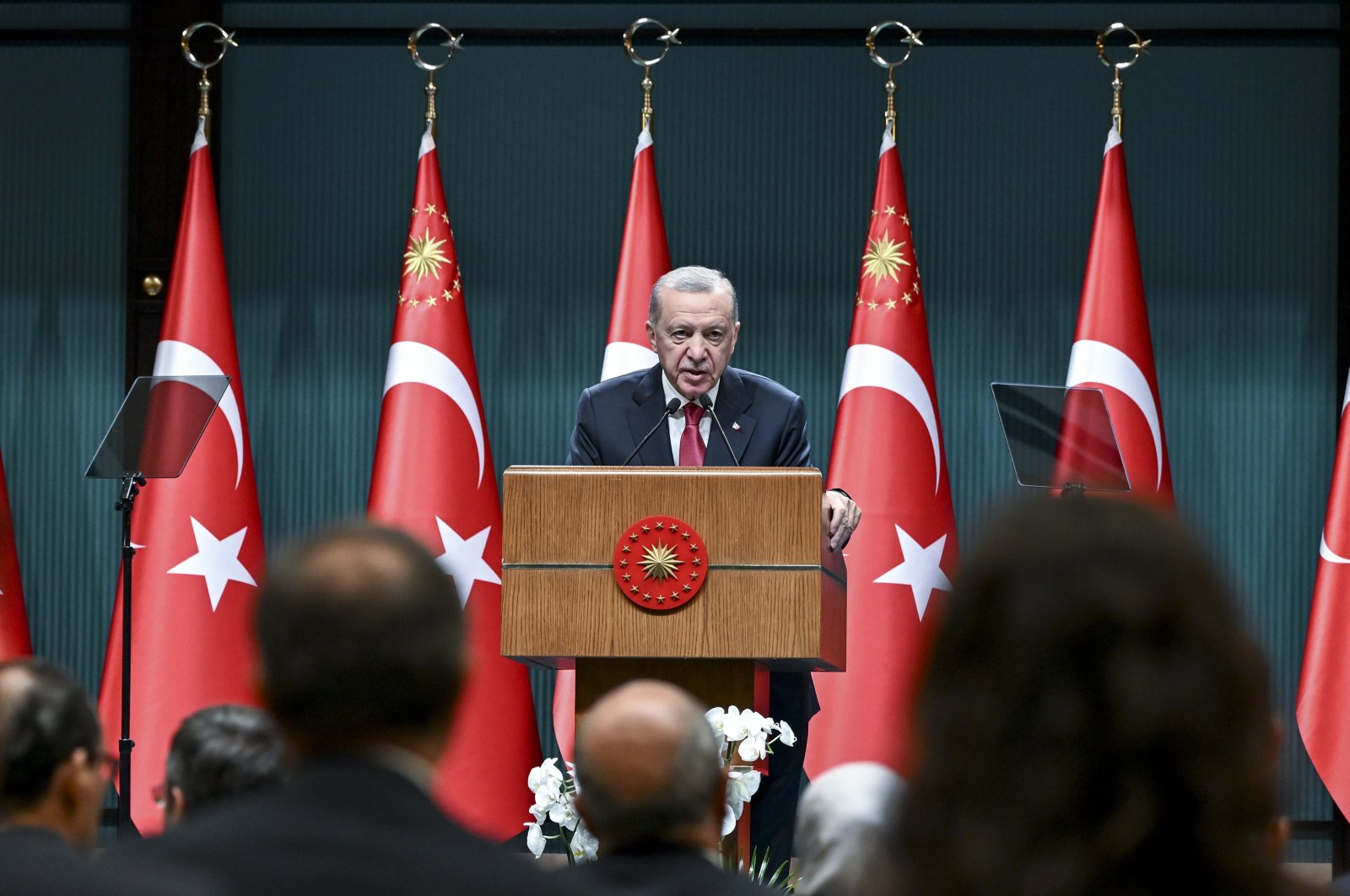
He warned that if Tel Aviv does not halt its attacks, its occupation would further expand, posing an immediate threat to the countries of the region.
The president said it is "unthinkable" for the Organization of Islamic Cooperation (OIC), which he said is obliged to protect Jerusalem, to remain indifferent to Israel's attacks, which are becoming more reckless day after day.
He called on the OIC to immediately hold a leaders meeting and display the determined stance of the Muslim world against Israeli aggression without delay.
Erdoğan also hailed improved Türkiye-Egypt relations, saying that the two countries are holding consultations about Gaza, issues regarding Eastern Mediterranean and Africa.
"We support Egyptian authorities regarding their mediation work in Gaza," Erdoğan said, adding that Israel pursues to further expand its occupation and invasion policy to include Masjid al-Aqsa 'n Jerusalem.
Decrying Israel's killing of Turkish-American peace activist Ayşenur Ezgi Eygi, Erdoğan said Ankara would take all legal steps to ensure that Tel Aviv is held accountable by submitting an application to the International Court of Justice (ICJ).
On Sunday, President Erdoan renewed his call to Muslim countries to unite to stop Israel's newest violent attacks on Palestinians that have already spanned nearly a year.
Türkiye has sought to improve and resume ties with Egypt and the Bashar Assad regime of Syria. Erdoğan also said one of the factors in normalizing ties is "to form a line of solidarity against the growing threat of expansionism" that also threatened Lebanon and Syria. His remarks came a few days after he hosted Egyptian President Abdel-Fattah el-Sissi in Ankara, the first visit by the Egyptian leader to Türkiye in 12 years.
Türkiye has been fiercely critical of Israel’s brutal offensive in Gaza, which it and others say amounts to genocide. It has also slammed many Western allies for their support of Israel and repeatedly called for Muslim unity to facilitate a desperately needed cease-fire. Ankara urges Israel to reciprocate the constructive approach of the Palestinians in cease-fire negotiations and the international community to pressure Netanyahu’s government. Türkiye has also formally applied to join South Africa's initiative to have Israel tried for genocide at the International Court of Justice (ICJ).
Ankara has sought to mobilize Muslim and Arab countries to stand in the face of Israeli aggression and has been a fervent supporter of the Palestinian cause. It joined a diplomatic group consisting of ministers from various countries that went on a globetrotting mission to ensure more action by the international community to halt Israel’s attacks targeting innocent Palestinians and for a lasting peace.
https://www.dailysabah.com/politics/diplomacy/erdogan-urges-regional-solidarity-against-israel
Anadolu Agency – September 9, 2024
Hundreds mourn for Turkish-US activist slain by Israel in West Bank
Hundreds of mourners gathered in the West Bank city of Nablus on Monday to pay respects and bid farewell to Turkish-American activist Ayşenur Ezgi Eygi, who was killed by Israeli forces on Friday.
The funeral procession began from Rafidia Government Hospital in Nablus, with mourners walking through several streets, chanting slogans condemning Israeli actions and praising foreign supporters, according to an Anadolu Agency (AA) reporter.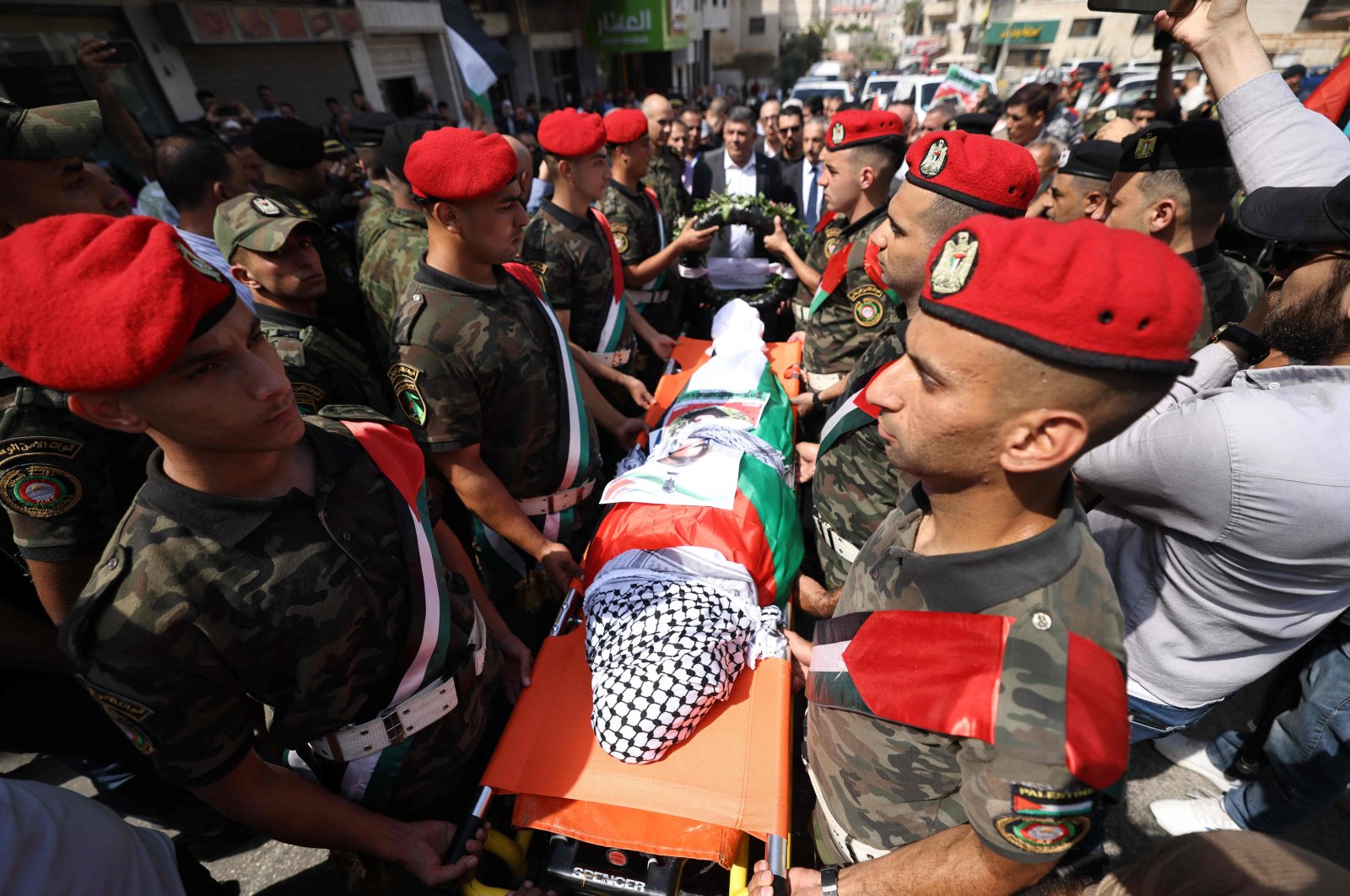
Mourners performed the funeral prayer, led by Nablus Governor Ghassan Daghlas, with the participation of leaders from various Palestinian factions and a large public turnout.
The body carried on shoulders, was wrapped in the Palestinian flag, with the head covered by the traditional Palestinian keffiyeh.
Eygi's body is expected to be transported to Türkiye.
Eygi, 26, a dual citizen of Türkiye and the U.S., was shot dead by Israeli forces during a Friday protest against illegal Israeli settlements in the town of Beita in the occupied West Bank.
Early Monday, Turkish Foreign Ministry spokesperson Öncü Keçeli announced that his country is working to facilitate the handover of Eygi's body.
"We continue the necessary work to deliver the body of our citizen Ayşenur Ezgi Eygi, who was killed by Israeli soldiers in the West Bank, to her family for burial," Keçeli wrote on X.
The Israeli military has yet to comment on the specifics of the incident or the findings of the autopsy.
Eygi's killing echoes the case of American-Palestinian journalist Shireen Abu Akleh, who was killed similarly in 2022.
Yeni Safak – September 9, 2024
Italian activist who witnessed Aysenur Ezgi Eygi's final moments recounts tragic event
An Italian activist who witnessed the final moments of Aysenur Ezgi Eygi, a Turkish American activist who was killed last week by Israeli soldiers in the West Bank during a protest against illegal Israeli settlements, described the attack.
“About 200 meters away, there were Israeli soldiers on the roof of a Palestinian house. We were standing on the side of the road in an olive grove and Aysenur was a little behind me under an olive tree,” said Mariam, who only gave her first name, speaking to Anadolu at Rafidia Hospital in Nablus.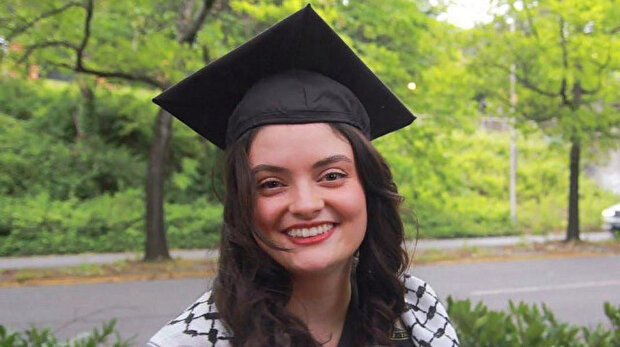
Saying that Israeli soldiers stopped near Evyatar, an illegal Israeli settlement seized from Palestinians, about 200 meters (656 feet) away, she said: “Palestinians prayed the Friday prayer. After the prayer, incidents broke out between the Palestinians and the army. The Israeli army dispersed the crowd using tear gas and then live bullets. We retreated down the hill to the side of the road, and about 200 meters away, there were Israeli soldiers on the roof of a Palestinian house. We were standing by the side of the road in an olive grove. Aysenur was a little behind me under an olive tree.”
“We were clearly visible to the soldiers. We were just standing there, not doing anything. Suddenly I heard two shots. One of them hit a metal object. Then my friends called out my name. Aysenur was lying unconscious under a tree. We called for more people. We put her in an ambulance. We came with her to Beita Health Center, and from there, we brought her to the hospital in Nablus. They tried to save her, but she died.”
- International activists have faced more attacks by settlers since Oct. 7
Mariam said she met Aysenur a few days before the attack and pointed out that the Turkish American activist was a member of the International Solidarity Movement (ISM), of which Rachel Corrie, an American activist killed in Rafah in 2003, was a member.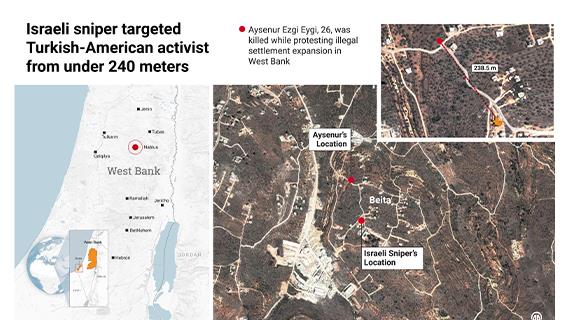
Mariam said Aysenur was very excited to participate in the demonstration to support the struggle of the Palestinian people and that she shared her excitement, but she was very uneasy due to the excessive force used by the Israeli army.
She said that Palestinians have been suffering for decades, but after Oct. 7, this increased exponentially.
“The settlers' violence and the army's harassment have increased like an avalanche after Oct. 7. International solidarity activists have also been attacked more by settlers, and activists have been shot at and injured. Palestinians are the primary victims of the increased tensions, but attacks on international solidarity activists have also increased.”
Mariam said that far-right fanatical Israeli settler groups monitor and control the social media accounts of international solidarity activists.
“Our governments have the blood of all Palestinian martyrs on their hands -- my friend Aysenur and the activists before her. We demand accountability not only for Aysenur, but for all Palestinian martyrs. Stop arms sales to Israel. We demand a just solution for a free Palestine,” she added.
Eygi's body is being held at Rafidia Hospital. International solidarity activists, Palestinian official representatives and the public gathered at the hospital for the official funeral, while technical preparations for it are ongoing.
Yeni Safak – September 8, 2024
Whose life matters more to the U.S.?
Abdullah Muradoğlu
In the Israeli-occupied West Bank, Turkish-American Ayşenur Ezgi Eygi was shot and killed during a protest against the expansion of Zionist settlements. The 26-year-old was a volunteer with the International Solidarity Movement (ISM), a group that included Rachel Corrie, the American activist killed by an Israeli bulldozer in Gaza in 2003.
The White House National Security Council spokesperson, Sean Savett, expressed deep concern over Ayşenur Ezgi Eygi's "tragic death," stating that they had contacted the Israeli government to demand more information and initiate an investigation. Similarly, the U.S. State Department’s statement from Matt Miller echoed this sentiment.
Both statements referred to Eygi’s “tragic death” but failed to mention that she was killed by Israeli soldiers, leaving ordinary Americans to seek out the full details themselves. When President Joe Biden and Vice President Kamala Harris speak about "tragic Palestinian deaths," they also avoid addressing who is responsible. This language reflects a long-standing trend in U.S. and Western media, which hesitates to acknowledge the role of Israeli forces in such incidents.
Ayşenur Ezgi Eygi is not the first American killed by Israel in occupied Palestinian territories. Rachel Corrie, 14-year-old Urwa Hammad, 16-year-old Mahmoud Shalan, and journalist Shireen Abu Akleh were also killed, but their cases remain unresolved due to Israel’s refusal to cooperate with U.S. judicial authorities. The U.S. government, in turn, has allowed these cases to fade away, enabling Israel to avoid accountability.
Recently, Hersh Goldberg-Polin, an Israeli-American hostage, was found dead in Gaza. Vice President Kamala Harris, like Biden, emphasized that ensuring the safety of U.S. citizens abroad is a top priority. U.S. officials, including senators, echoed Israel's claim that Goldberg-Polin was executed by Hamas, with Senator Lindsey Graham calling for retribution and Senator Tom Cotton urging the Biden administration to "finish the job" in Gaza.
In contrast, the deaths of Americans at the hands of Israel remain shrouded in ambiguity. Taylor Force, an American killed by a Palestinian in Tel Aviv in 2016, prompted Congress to pass the Taylor Force Act, which limited financial aid to the Palestinian Authority. The act was signed into law by President Donald Trump, who also cut funding to the United Nations Relief and Works Agency (UNRWA) for Palestinian refugees.
Since October 7, the U.S. has provided Israel with over 50,000 tons of weapons, despite Israel’s killing of more than 40,000 Palestinians, including nearly 17,000 children. The lack of accountability for Israel’s actions, even when American citizens are involved, highlights a double standard.
https://www.yenisafak.com/en/columns/abdullah-muradoglu/whose-life-matters-more-to-the-us-3690636
Anadolu Agency – September 9, 2024
Strong August affirms Türkiye's march toward record defense exports
Türkiye’s defense and aerospace industry made $423 million worth of exports in August, official data showed on Monday, maintaining an upward course that could see it reach a fresh all-time high in sales by the end of the year.
The sector’s outbound shipments rose 12.6% compared to a year ago, Haluk Görgün, the head of the Presidency of Defense Industries (SSB), said on social media platform X.
"Our defense and aerospace exports rose by 9.8% in the first eight months compared to the same period last year, amounting to $3.738 billion,” said Görgün.
“Over the past year, our exports have grown by 13.4% annually."
Driven by combat drones, Türkiye’s defense exports reached a record $5.5 billion in 2023, renewing the peak of $4.4 billion in 2022.
That figure is estimated to approach $7 billion by the end of 2024, according to officials.
Görgün emphasized that the primary goal of the national defense industry's strategy is to achieve a lasting upward trend in the export of high-value-added products.
"Our companies are not limited to a specific region; they can export to almost the entire world. In 2024, our companies exported products to 171 different countries. This is another key target we have successfully reached," he said.
Türkiye's defense industry has undergone a profound transformation over the last two decades, in a breakthrough that has been spurred by a score of Western embargoes.
The transformation aimed at reducing external dependency on Western arms through innovative engineering initiatives and domestically developed technologies and ensuring self-sufficiency.
The drive prompted the development of a range of homegrown air, land and marine platforms, which eventually helped Türkiye seal billions of dollars worth of export deals in recent years.
The localization drive helped lower Türkiye's foreign dependency in the defense industry from around 80% in the early 2000s to some 20% today.
In India’s heartland, this is how Hindu far right is bulldozing Muslims
The story of a small village in Madhya Pradesh exemplifies the perils of the minority community – caught between biased official machinery and Hindu groups affiliated with PM Modi’s party.
Shadab Farooq
Madhya Pradesh, India: Up until a few months back, 17-year-old Zeenat Qureshi was like any of the tens of millions of girls her age in India. She was poor and had to help her mother in their brick home in a village in Madya Pradesh and tend to the cattle. But she had a family, her things, and friends.
Zeenat died on August 9. She died of pneumonia, a doctor told her family. She got sick after getting drenched in the rain. It wasn’t like she wanted to get wet. She didn’t have any choice but to brave the downpour. Zeenat was among dozens of people living in the open in Bhainswahi village. All of them are Muslims, and the authorities bulldozed their homes.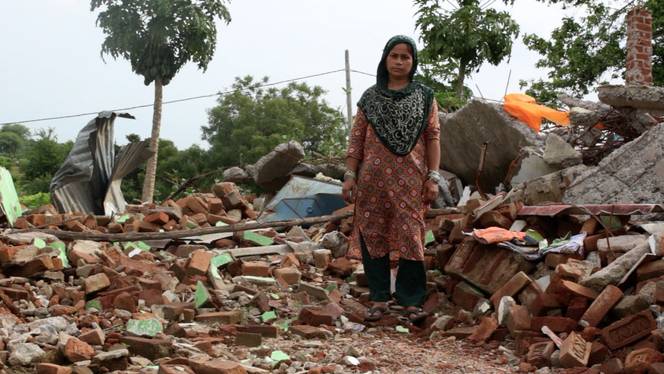
Her father attended the funeral in handcuffs with policemen by his side. This is a story of how India’s government built homes for the poorest segment of society and then bulldozed them based on religion.
And it all started with the rumour of an injured cow.
In the early hours of June 15, dozens of armed police officers descended on Bhainswahi village in Mandla district of Madhya Pradesh, a large province smack in the middle of India.
Police officers, wielding guns and batons, cordoned off a part of the Muslim-dominated village and ordered everyone to come out of their houses.
“They didn’t even give us time to collect (our) children’s school books or our valuables,” says Aliya Bano, a 30-year-old mother.
"My daughters begged the police to let them save their school things…their uniforms, their books – everything is buried under there now," she tells TRT World, gesturing to the pile of debris.
A few hours later, authorities brought in bulldozers and razed at least 16 houses into piles of rubble as women and children wailed and protested nearby. They were all Muslim homes.
“Our entire life savings are gone- all the money my husband worked so hard for – it's all in there," says Gulshan Bano, another victim, her eyes fixed on the ruins of her demolished home.
What happened in Bhainswahi village is a stark reminder of how constitutionally secular India has become hostage to Hindu right-wing groups, which are regularly inciting religious sentiment for political and electoral gains.
At the centre of it is an allegation that Muslims slaughter cows, considered sacred in Hindu religious mythology.
Several states have banned cow slaughter since Prime Minister Narendra Modi’s Hindu nationalist Bharatiya Janata Party (BJP) came to power in 2014. Violators can be punished with imprisonment for up to 3 years.
Over the years, Hindu extremist groups or cow vigilantes have taken it upon themselves to ‘protect’ cows, which freely roam the roads in many cities, including India’s IT hub of Bangalore.
Vigilantes often set up unauthorised checkposts on roads and highways, stopping trucks to check if cows are being transported.
In a matter of weeks in June this year, ten incidents were reported where mobs attacked people transporting cattle.
In a 2019 report, the rights group Human Rights Watch said more than two-thirds of the people killed by radical vigilantes were Muslims. Last year, a video went viral in which a Muslim truck driver was hacked to death in the middle of the road in Bihar.
Ironically, Bhainswahi means ‘buffalo’ in Hindi. A few days before the police ‘operation’, a cow had allegedly jumped out of a truck in Mandla and was dragged along the road.
Members of Bajrang Dal and Vishwa Hindu Parishad, right-wing groups aligned with Modi’s BJP, took to the streets in protest. The cow was being transported to be slaughtered in Bhainswahi, they said and demanded that police register a case and investigate it. They had threatened to take their protest to the Muslim-majority parts of Bhainswahi if the police didn’t act.
What followed has become a neverending nightmare for scores of Muslims.
A meaty nightmare
“Cow meat? Yes, look here; there’s so much of it everywhere. You can even see it today,” says Aliya Bano. The irony in her words does not escape her gestures toward a pile of concrete, twisted iron rebars and clothes in the ruins of what was once her home.
Bano looks much older than her three decades, her weather-beaten face creased with weariness from the years of hard labour. Her husband is a junk scrap dealer, and she helps him out with that.
A month after the demolitions, TRT World visited the village, which requires a 17-hour-long train journey from New Delhi to Jabalpur and then a three-hour drive to reach the village.
Police have since arrested at least 11 Muslim men and implicated them in cases related to illegal butchering and sale of cows. But the family of the detainees and others in the neighbourhood denied slaughtering cows.
Locals say they only milked cows.
“We had four animals—a cow, a goat, a cat, and a dog. The police only took the cow. I had never seen so many police in one place in my life. They didn’t let us take anything from our house,” says Bano.
Local activists and journalists say the whole police operation was nothing more than an appeasement campaign in which officials try to score points with their superiors by trying to enforce Hindutva ideology.
The raid and the demolitions occurred at a time when Muslims in India, like the rest of the Muslim world, were preparing for Eid al Adha, the Festival of Sacrifice, during which they slaughter sheep, goats and cows.
Neha Pachisia, the sub-divisional police officer of Nainpur, tells TRT World that cow meat and hides were found in some of the homes owned by Muslims.
“We were very amazed to find meat buried in holes in the ground, in fridges and found cow hides.”
Locals deny that the police had found anything to do with cows.
“They (the police) found nothing in my home, yet they bulldozed it”, says Sultana Bi, who works as a labourer. "My husband works in scrap collection, and I am a manual labourer too. We handle various tasks for the gram panchayat, and our daughter helps too," Bi explains.
Whose bones are they anyway?
But even if meat and bones were found, how could police be sure that they belonged to a cow and not a buffalo?
“We can tell by looking at bones, horns and skulls,” says police officer Pachisia when TRT World pressed her for an explanation. “ We could directly see cows tied, cow bones, cow skulls- these are enough evidence to prove and start the probe on the spot.”
She refused to comment on the forensic report of samples collected from Bhainswahi village and sent for analysis to a lab to establish that cows were slaughtered and illegally traded there.
The Muslim men have been arrested for violating the 2004 Cow Protection Act. Their families have approach the high court, after a lower court rejected their plea.
Sultana Bi and her four children are living in a makeshift tent, barely 6 by 6 feet in size, near the rubble of their home, hoping that their misery will end soon.
“I just want my husband to come home. I have young daughters; where will I go with them? No one is willing to host us. Our relatives and friends are scared that we will bring trouble to their doorstep,” Sultana Bi says.
Even in the absence of any evidence or court conviction, Vishwa Hindu Parishad, the right-wing group that agitated the matter, is convinced that Bhainswahi was the epicentre of cow slaughter.
“For 30 years, we have known what happens in Bhainswahi,” says Sonal Barman, chief spokesperson of the VHP’s Mandla unit.
“Bulldozing their homes is not enough. We want them hanged,” Barman adds.
The path from an injured cow to the demolition of 16 houses is a short and stark one, highlighting the volatile intersection of religious sentiments, cow vigilantism, and official action that seems to be growing in the state of Madhya Pradesh.
Dozens of Muslim-owned houses and buildings have been demolished in different parts of Madhya Pradesh over the week of Eid celebrations. This happened in various districts like Mandla, Jaora, Ratlam, Seoni, and Morena.
However, India’s cow protection laws have no provision for demolishing someone’s house - a tactic being regularly used to target Muslim protestors and descendants in recent years.
Instead, what Indian authorities do is use flimsy accusations that homes were illegally constructed. But in Bhainswahi, police and the Hindu right-wing groups hadn’t considered a small but significant detail.
The government’s gift
Among the 16 demolished houses, six of them were built under PM Awas Yojana and three under Indira Awas Yojana – two federally-funded projects aimed at providing low-cost housing to the economically weaker sections of society.
Asiya Bano, whose house falls under the PM Awas Yojana, says, “They are saying that our homes were illegally built. How come these were illegal if they were given by the government?” Aliya Bano, whose house comes under the Indira Awas Yojana, says, “ Modi gave us these houses, and he is the one who took them from us.” When police officer Neha Pachisia was asked about the demolition of houses built under government schemes, she stopped the interview midway and asked this correspondent to take up the matter with higher authorities.
The Bhainswahi demolitions have drawn attention to Madhya Pradesh's new Chief Minister, Mohan Yadav, and his political moorings in the Rashtriya Swayamsevak Sangh, the ideological fountainhead of most Hindu rightwing groups in India, including the BJP.
Yadav, who assumed office in December 2023, has been vocal about his commitment to Hindutva ideology. Many saw his appointment as CM as a signal of the BJP's intention to pursue a more assertive Hindu nationalist agenda in the state. "Let's be clear - this isn't about enforcing laws or proving anyone's loyalty," Gauhar Raza, an Indian scientist and social activist, states. "Chief Minister Yadav isn't trying to prove himself to anyone. He's a product of the RSS, he is the RSS through and through." "The 'Bulldozer Raj' is not just about demolitions - it's a campaign of terror against Muslims," Raza states. He sees the actions in Madhya Pradesh as calculated steps towards a more sinister goal: "They're trying to make it impossible for Muslims and Hindus to coexist peacefully. It's the Hindutva ideology gaining ground in the state and its actions."
"By destroying homes and seizing land, the state is sending a clear message to Hindus - 'We're on your side against the Muslims.' But make no mistake, this is part of a much larger, more dangerous plan. These actions are laying the groundwork for potential genocide", Raza explains.
The events in Bhainswahi bear a striking resemblance to incidents in neighbouring Uttar Pradesh under Chief Minister Yogi Adityanath. Since 2017, the UP government has frequently employed bulldozers to demolish properties allegedly linked to criminals or built illegally, often targeting Muslim communities.
"What's happening in BJP-ruled states isn't just similar to Uttar Pradesh under Yogi Adityanath. The real blueprint for this comes from Nazi Germany," Raza asserts. "Hitler used bulldozers too. It's a dark and chilling similarity."
Shadab Farooq is an independent journalist hailing from Bhaderwah, Jammu and Kashmir. He is currently based in New Delhi, India, covering religion, politics, the environment, and culture.
France faces rising anti-Muslim violence. A terrorism trial won't fix it
An upcoming prosecution barely addresses France's growing Islamophobia and in fact exposes the state's reluctance to fully confront its role in enabling increasing instances of hate.
Hannan Hussain
More than a dozen people associated with the French far-right group Action des Forces Operationnelles (AFO) will soon appear in a terrorism trial for commiting suspected acts of anti-Muslim violence, including a conspiracy to kill 200 Muslim preachers.
The proceedings, which have been ordered but not scheduled, will focus on attacks planned between 2017 and 2018, and come as the country witnessesᅠa dramatic rise in anti-Muslim violence since Israel's Gaza onslaught began in October 2023.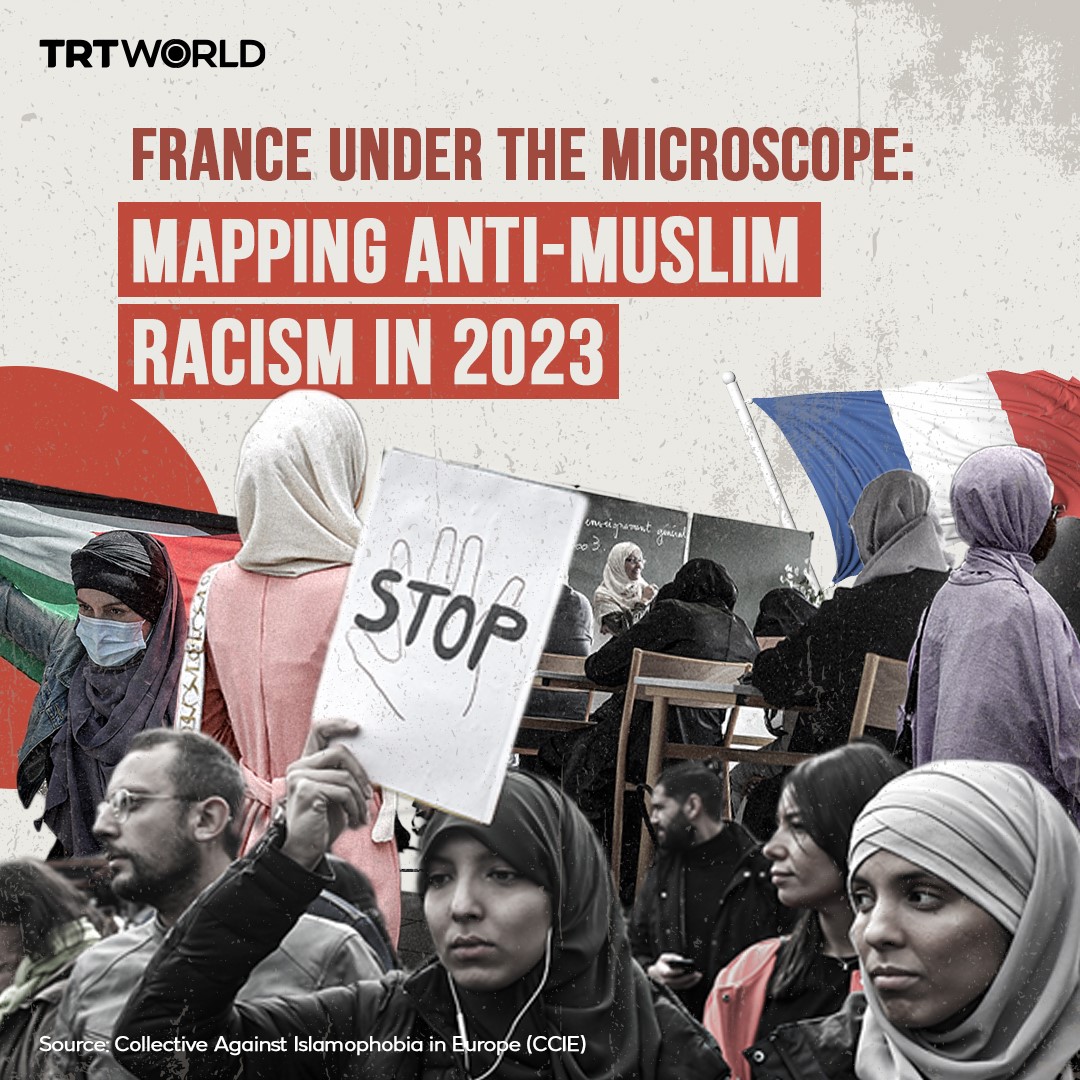
But despite being a small step in the right direction, the long overdue trial struggles to strike at the heart of a much larger problem: state tolerance for rising anti-Muslim violence in France.
The country's treatment of anti-Muslim groups and the way itᅠapproaches Muslim rights and liberties are like night and day. The AFO trial simply brings those double standards out into the open, and exposes the government’s role in contributing to anti-Muslim violence over the past several months.
Far from justice
According to prosecutors, the AFO was planning to kill 200 Muslim preachers and launch grenade attacks against Muslim community members. It planned to engage long-range shooters in a terrorist attack against a mosque in Clichy-la-Garenne, Paris and use female members to poison halal foods in supermarkets.
However, because the plans were not actually carried out, the criminal actsᅠwere reclassified as "misdemeanours," laying the groundwork for a shorter prison sentence – if any.
This decision seems risky, particularly at such a politically volatile moment. The sudden reclassification could have an empowering effect on other anti-Muslim groupsᅠthat are set to face trial. Consider the "Barjols."
Its members have conflated terrorism with Islam in the past and expressed aᅠdesire to burn Muslims. Group members are now set to enter trial next month, and if the AFO's attempt at anti-Muslim massacres can be explained away as misdemeanors, the Barjols could avoid accountability through a similar precedent.
Aᅠthreatened French Muslim community doesn't deserve these contradictions. Given that anti-Muslim violence has risen sharply over the past year, the state owes a concrete assurance that the freedoms and liberties of Muslims are well protected from far-right violence.
For instance, the French Muslim Council received 42 threatening letters, and over a dozen mosques have been vandalised since Israel began its war on Gaza in October. A Franco-Turkish cultural association in Loiret was targeted last year, alongside the Turkish-Islamic Union of Religious Affairs (DITIB) in southern France.
According to the Council of Europe Commission against Racism, there has been a surge in anti-Muslim incidents since last October, and Muslims wearing religious symbols were at times associated with terrorism and extremism.
Islam and the state
France is home to six million Muslims, or about 7 to 10 percent of its population. Many officials have long seen the community to be a threat to France's "secular values."
The country already has legislation that stigmatises Islamᅠin the form of hijab bans, expanding surveillance of mosques, and tightening state control over community organisations.
Things have gotten worse since October.
Ahead of the 2024 Olympics in Paris, critics say France used the need to maintain security as a cover to crack down on its Muslim constituents.
Under French Interior Minister Gérald Darmanin, a system of surveillance and obstruction was used to conduct violent raids on Muslims and make it possible for French authorities to devise interventions against "any target" listed on the country's controversial radicalisation and terrorism watchlist (FSPRT).
In a recent meeting with German Federal Minister Nancy Faeser, Darmanin also pledged a closer front with Berlin to counter "Islamist extremism," while leader of the far-right National Rally party, Jordan Bardella, has promised to pass a draft law which would help shut down mosques and deport preachers that the state deems as "radicals."
It's important to note that taking actions against Muslims deemed to be a threatᅠdoesn't requireᅠincriminating evidence.
In stark contrast, far-right aggressors in the AFO trial could end up with lenient sentences. Suspectsᅠwill be tried for "terrorist criminal conspiracy" against Muslims, but in a court that doesn't even have the mandate to rule on terrorism. This means they face shorter sentences, and will not be tried before a jury.
Thus, protections for Muslims seem unlikely when the state itself has impossibly higher standards for this community compared to the rest of its population.
Is France doing enough?
It would be a mistake to view the AFO trial as an actual attempt to bring perpetrators of violence to justice. In fact, it offers a glimpse of a system that is still reluctant to call it terrorism when far-right groups plot mass killings,ᅠbut not when French Muslims exercise their right to peaceful protest.
Since fundamental Muslim freedoms figure low on the government agenda, far-right accountability remains a pipedream.
Look to the country's divisive discourse on Israel's war against Gaza. Paris hasᅠincreasingly normalised arbitrary arrests of Muslims who demonstrate solidarity with Palestinians, targeting their right to peaceful assembly and portraying arrestsᅠas a counterterrorism imperative. More importantly, the legislation used to impose such unlawful restrictions – France'sᅠ"anti-terror" law – serves far-right interests.
That's because prominent voices from the hard-right, led by Marine Le Pen, see it as a wayᅠto further expand disproportionate restrictions on Muslims and reinforce their narrative of a so-called "Islamist threat."
This is important because far-right activism against Muslims has been resonating with other violent groups, such as the Organisation of Social Armies. As "terrorism" remains disproportionately focused around Muslim liberties, French liberals and the hard right are making it difficult to call out far-right violenceᅠfor what it really is.
Interestingly, AFO's desire to poison halal products in supermarkets is also rooted in the wider, state-sponsored persecution of Muslim women in France. After all, the suspects' goal was to wearᅠniqab costumes to facilitate the poisonings. This symbolises anti-Muslim aggression and severe contempt towards women's right to choose what they wear.
Whether through a hijab banᅠin state schools, unlawful restrictions on full-face veils, orᅠa ban on the abaya, the French government has helped perpetuate a glaring bias against Muslim women.
These discriminatory measures have prompted the far-right to increaseᅠIslamophobic rhetoric, andᅠintensified racial profiling of Muslim women. Unless the drivers of social exclusion and religious discrimination are addressed, French Muslims could continue to face far-right extremism.
Thus understood, AFO's anti-Muslim plotting took place in a society that holds severe intolerance towards French Muslims. It is still unclear why France would take up a case from 2018, but show limited regard for surging anti-Muslim violence in recent months.
Ultimately, it will take more than just a terrorism trial for France to change the harsh reality on ground and create a climate of equality for its six million Muslims.
Hannan Hussain is a Senior Expert at Initiate Futures, an Islamabad-based policy think tank and author. He was a Fulbright Scholar of international security at the University of Maryland, and has consulted for the New Lines Institute for Strategy and Policy in Washington. Hussain's work has been published by the Carnegie Endowment for International Peace, Georgetown Journal of International Affairs, and the Express Tribune (partner of the International New York Times).

|
Published since July 2008 |
Your donation
is tax deductable.
The Journal of America Team:
Editor in chief:
Abdus Sattar Ghazali
Senior Editor:
Prof. Arthur Scott
Special Correspondent
Maryam Turab




